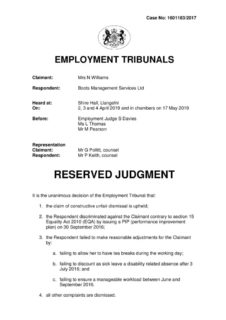The claims brought, by claim form dated 5 December 2017, were of constructive dismissal and disability discrimination.
The court found that the Respondent failed to make reasonable adjustments for the Claimant by:
a. failing to allow her to have tea breaks during the working day;
b. failing to discount as sick leave a disability-related absence after 3 July 2016; and
c. failing to ensure a manageable workload between June and September 2016.
The Claimant withdrew a complaint of discrimination arising from disability in respect of a failure to carry out a workplace risk assessment, which complaint is accordingly dismissed. The hearing was listed to deal with the question of liability only.
The Claimant says that she noticed her symptoms getting progressively worse when daily tea breaks were removed at work and when other pressures were placed on her, such as an increased workload as a result of short staffing levels and additional duties to include training new members of the team as a result of special measures. The Claimant asserts that she had no support to accommodate her condition and the pain would become unbearable.
The Tribunal’s findings that the Claimant was subject to acts of discrimination go to the heart of the implied term of trust and confidence. This situation was compounded by the increasing workload over the ensuing months and the change to the Claimant’s working pattern.
The Tribunal considered that the Respondent’s actions, over a period of time culminated in the grievance outcome and appeal amounted to a breach of the implied term of trust and confidence.
The claim of unfair constructive dismissal was upheld.
